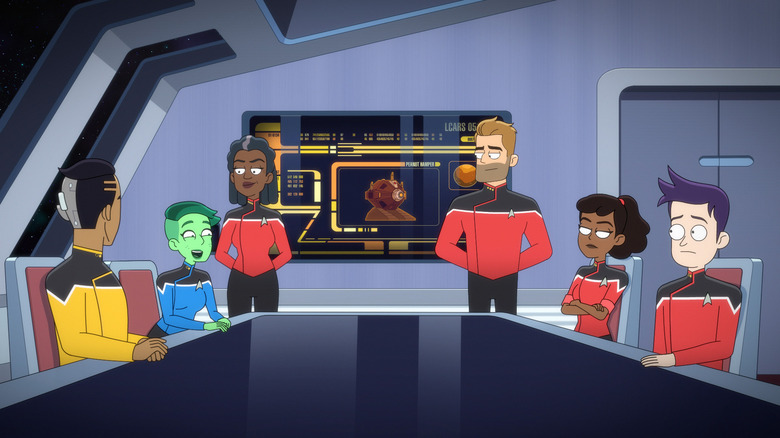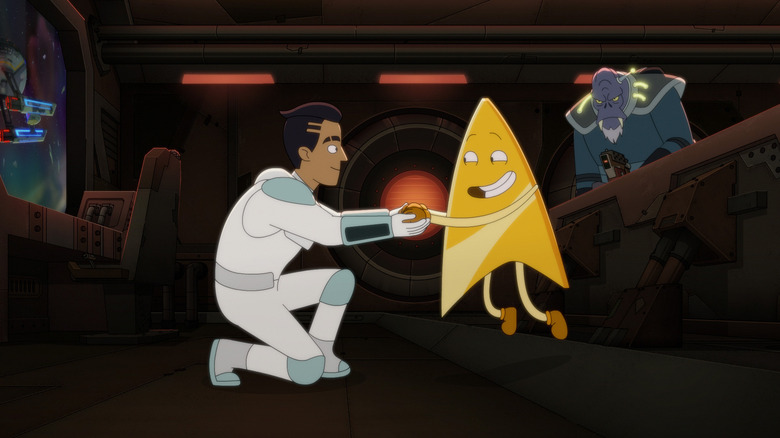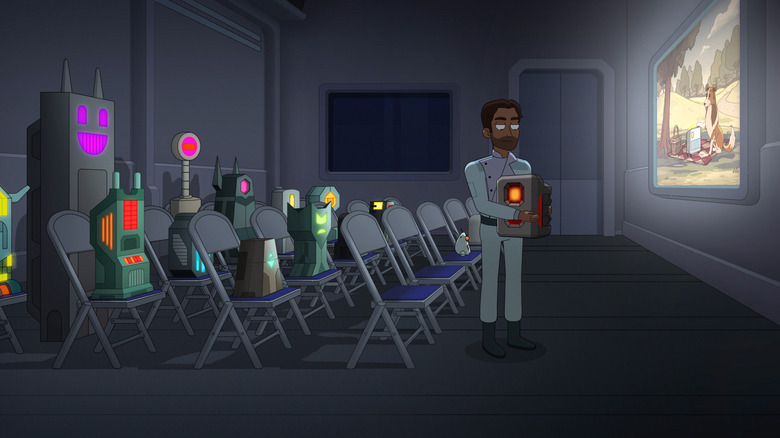Star Trek: Lower Decks' Big Villain Reunion Doesn't Go The Way You'd Think
This article contains spoilers for the latest episode of "Star Trek: Lower Decks."
After over 50 years of canon, "Star Trek" is littered with several cautionary tales of fearsome villains who nearly brought the entirety of Starfleet and even the quadrant at large to its knees, so wasn't it about time for "Lower Decks" to get in on the action? Throughout the series and especially in the fourth season, certain recurring antagonists have been carefully established and subsequently defeated, though with a few doors left open to potentially set up their ability to inflict maximum damage down the line. Well, that time has finally come as of episode 7, titled "A Few Badgeys More," but nothing quite unfolds the way viewers may have expected.
Here, that longstanding mystery behind that unidentified ship remains shrouded in secrecy yet again (sorry, fellow conspiracy theorists, looks like we'll have to wait for the season finale), but it comes with an added wrinkle. Over the course of the episode, we check in on a trio of angry antagonists introduced in previous seasons who are now out for revenge. Where fans may have expected a villainous team-up for the ages, however, the writing team zigs instead of zags and upends everyone's expectations in the process. By the end of the story, tough lessons have been learned, hurt feelings have been mended, and at least one villain basically transcends this plane of existence to become a god ... though even he experiences a profound change of heart as a result.
The final result is one of the wackier "Lower Decks" resolutions yet that, like all the best installments of "Trek," proves there are few things more interesting than well-rounded villains who pack a punch — but are able and willing to atone for their mistakes, too.
Playing god
So, let's have a show of hands: Who saw this coming? Sure, many fans expected the dastardly Badgey (Jack McBrayer) to return once again and exact vengeance upon his creator/father Rutherford (Eugene Cordero). But acquiring godlike powers that puts him on the same level as the Q Continuum, but with a much healthier and more mature outlook on life and existence in general? Yeah, that was a bit out of left field, but we'll take it!
Despite assumptions that Badgey might possibly recruit an entire posse of supervillains to wreak havoc on the Cerritos and Starfleet at large, the holographic bad guy's initial scheme turned out to be far more straightforward. It mostly entailed hijacking a Drookmani ship, baiting the Cerritos with a bogus distress signal, and promptly waging a surprise attack to rid himself of Rutherford once and for all. The tide begins to turn when Rutherford allows himself to be beamed over to Badgey's vessel and finally gives him the loving hug he's always wanted ... but that doesn't last for long as Badgey begins to split himself apart from his innate good qualities, leaving behind only his most evil urges. The stakes escalate to unprecedented apocalyptic levels when the "demon triangle" (as the Drookmani captain hilariously calls him) threatens to upload his own code to all of Starfleet's subspace relays, basically achieving omnipotence across the entire quadrant.
But with godhood comes a radical shift in perspective, apparently. Just when all seems lost, Badgey's transcendence makes all these petty squabbles feel meaningless. With a genuine apology for "all the drama," he promptly gives up his villainous ways to explore all of reality like few have ever done before. Classic Badgey.
How to make friends and not alienate people
Meanwhile, the storylines regarding the fearsome AGIMUS (voiced by "Star Trek" veteran Jeffrey Combs) and the stubborn Peanut Hamper (Kether Donohue) end up intersecting in unexpected ways. Having become friends during their imprisonment in Daystrom Institute, both villains say all the right things about having reformed from their evil ways (AGIMUS even changes his ominous red light to a much more trustworthy blue!) while secretly plotting their escape and the next stage of their plans for galactic conquest of all organics. But when AGIMUS ends up taking Boimler (Jack Quaid) and Tendi (Noël Wells) prisoner and he fails to find Peanut Hamper at their scheduled meetup spot, it soon becomes clear that he cares less about world domination and more about spending time with his pal (and possible crush?) Peanut Hamper.
In another vintage example of human emotions saving the day, these sparks of love between the two synthetics end up making a difference. Having tracked Peanut Hamper to some obscure research station where her fellow exocomps live out their days doing menial tasks, AGIMUS all but proclaims his love for her as the two agree to set aside their grand ambitions in favor of just spending more time together, like they wanted all along. Their dramatic about-face is sweet and awkward and a little weird, admittedly, but there's something to be said for both robots finding a sense of purpose, moving beyond their instincts for conflict, and pledging to become better individuals.
By the end, "Lower Decks" takes all the irredeemable villains it had previously introduced and gives them hopeful ends. Through each of these rampaging antagonists, the episode proves emphatically that there's always room for growth and progress. That's the "Star Trek" way!


